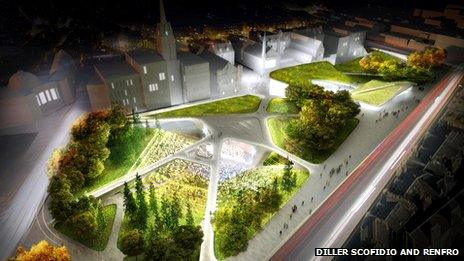Motion on Aberdeen's City Garden Project seconded
- Published

The cost of the winning Granite Web design is £140m
A motion for an alternative to Aberdeen's controversial City Garden Project has been seconded at a meeting of the council.
But the key vote on the proposed £140m project to transform the historic Union Terrace Gardens has yet to be taken.
A Tax Incremental Financing, external scheme aims to see a £92m loan paid back by increased income from business rates.
The Independent Alliance Group wants investment in Union Terrace Gardens and surrounding landmark buildings.
Independent group leader Marie Boulton's motion was seconded.
However, Callum McCaig, leader of SNP group, called for the City Garden Project to be supported.
And Conservative Alan Donnelly said the amendment was an "almighty fudge".
One of the first to speak among earlier delegations was Leo Koot, managing director of oil firm TAQA Bratani, who said Union Terrace Gardens was a "dark hole".
Attract young
However, that claim was contested by Iain Richardson, from Common Good Aberdeen.
Prominent Aberdeen hotelier Stewart Spence said the city needed to attract tourists, and required more than a spruce up.
Dan McCroskrie, speaking on behalf of the young people who support the scheme, said it was a once-in-a-lifetime opportunity which would help attract more young people into the city.
The cost of the Granite Web design, which won a contest to redevelop the gardens, would be £140m.
Businessman Sir Ian Wood has pledged £50m of his own money towards the scheme.
Other projects, including improvements to Aberdeen Art Gallery, also form part of the £92m TIF figure.
'Scrap the scheme'
Supporters of TIF argue it has the potential to create thousands of jobs.
However, opponents say it is too risky.
The council administration's senior coalition partner, Labour, has said it wanted to scrap the scheme.
In a referendum earlier this year, people were asked if they wanted to retain the gardens or back the City Garden Project redevelopment.
More than 86,000 votes were cast online, by post and by phone during the referendum. There were 45,301 votes in favour of the project, with 41,175 people opposed to the plans.
If it goes ahead, the project could be finished by 2017.
- Published22 August 2012
- Published21 August 2012
- Published13 August 2012
- Published10 August 2012
- Published13 July 2012
- Published28 June 2012
- Published5 July 2012